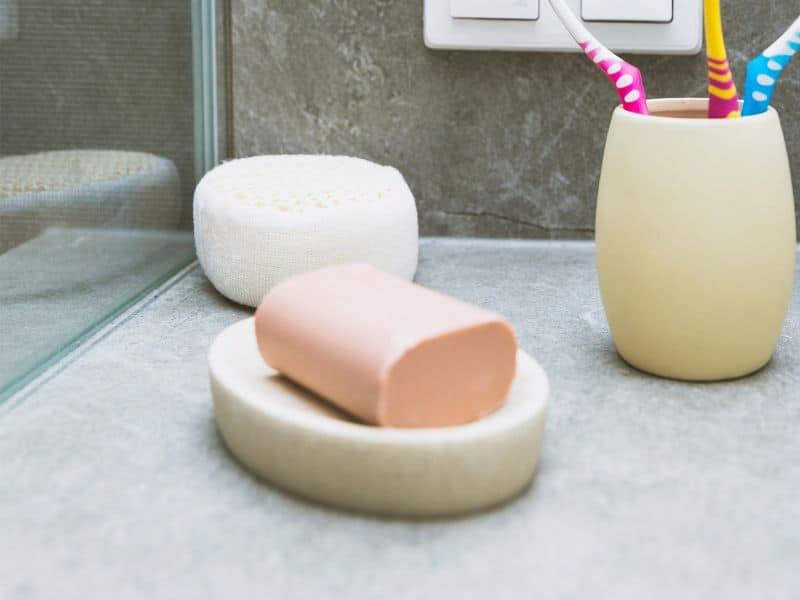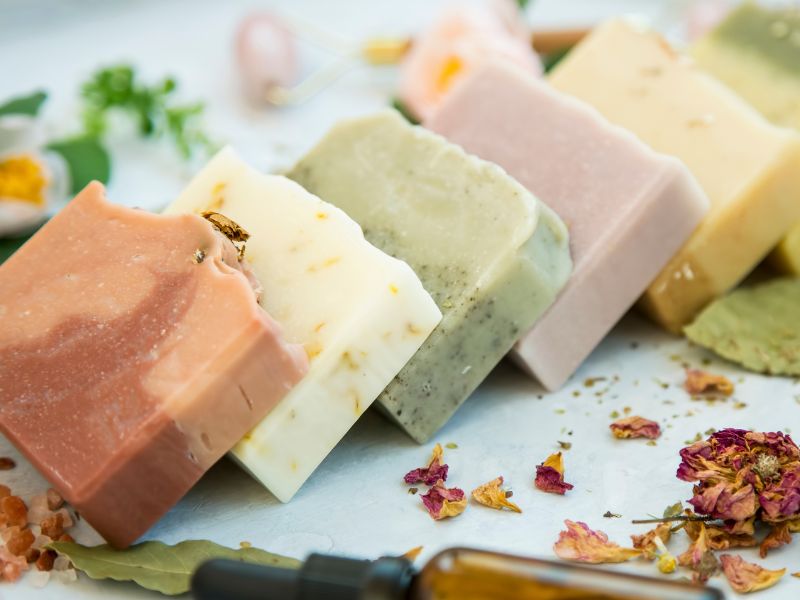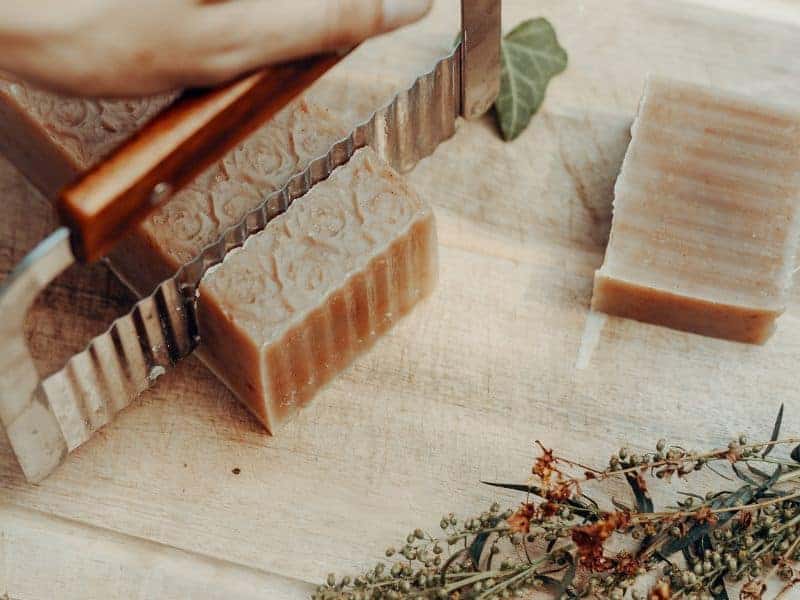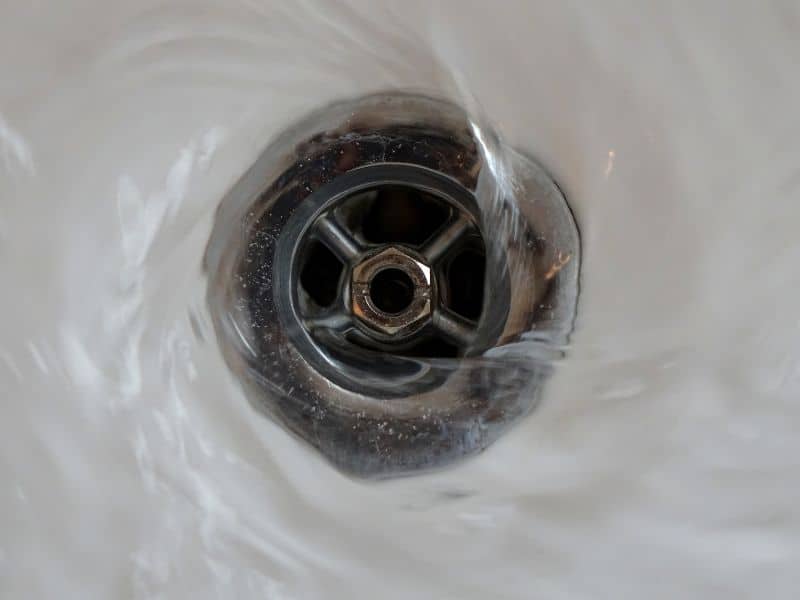Are you wondering how long your bar of soap will last? Fresh-smelling and luxurious soap can be expensive. We’ll discuss factors like soap type, storage conditions, lather quality, and expiration dates that affect the longevity of your favorite bars. We’ll also provide tips for extending their shelf life or repurposing them when it’s time to toss them in the trash!
Soap can last between 6 months to 2 years if stored properly and used regularly. The shelf life of soap can vary depending on the type of soap, ingredients used, and storage conditions.
For example, natural soaps may not last as long as commercial or synthetic soaps that use chemicals and preservatives. Let’s take a closer look at types of soap and how long they last.
How Long Will Natural Soap Last
The shelf life of natural soap can vary depending on several factors such as the ingredients used, storage conditions, and frequency of use.
Natural soap can last up to two years if stored properly and used regularly. Natural soap bars tend to last longer than liquid soap as they are less prone to drying out and can be stored in a cool, dry place.
Exposure to air and moisture can reduce the shelf life of natural soap, so it’s essential to keep it away from direct sunlight and humidity. Using a soap dish with drainage holes can also help prolong the life of natural soap by allowing it to dry between uses.
It’s important to note that the scent and texture of natural soap may change over time, but as long as it doesn’t show any signs of spoilage, it’s safe to use. It’s recommended to use natural soap within a year of purchase to ensure optimal quality and effectiveness.
How Long Will Handmade Soap Last
The shelf life of handmade soap can vary depending on the ingredients used, storage conditions, and frequency of use.
Handmade soap typically has a shorter shelf life than commercial soap as it does not contain preservatives. On average, handmade soap can last between 6 months to a year if stored properly and used regularly.
Exposure to air and moisture can reduce the shelf life of handmade soap, so it’s essential to keep it away from direct sunlight and humidity. Using a soap dish with drainage holes can also help prolong the life of handmade soap by allowing it to dry between uses. It’s important to note that the scent and texture of handmade soap may change over time, but as long as it doesn’t show any signs of spoilage, it’s safe to use.
It’s recommended to use handmade soap within 6 months of purchase to ensure optimal quality and effectiveness. With proper storage and use, handmade soap can provide a luxurious and effective cleansing experience that is gentle on the skin.
How Long Will Synthetic Soap Last
Synthetic soap, also known as commercial soap, typically has a longer shelf life than natural or handmade soap as it contains preservatives.
Synthetic soap can last up to two years if stored properly and used regularly. Exposure to air and moisture can reduce the shelf life of synthetic soap, so it’s essential to keep it away from direct sunlight and humidity.
Using a soap dish with drainage holes can also help prolong the life of synthetic soap by allowing it to dry between uses. It’s important to note that synthetic soap may lose its scent and color over time, but as long as it doesn’t show any signs of spoilage, it’s safe to use.
It’s recommended to use synthetic soap within two years of purchase to ensure optimal quality and effectiveness. With proper storage and use, synthetic soap can provide an affordable and convenient cleansing experience that is effective in removing dirt and oils from the skin.
However, some synthetic soaps may contain harsh chemicals that can strip the skin of its natural oils, so it’s important to choose a mild and gentle formula that is suitable for your skin type.
Factors that Affect Soap’s Shelf Life
In addition to the above-mentioned factors, other factors can also affect the shelf life of soap.
Ingredients used in making soap
Some soaps may contain natural additives such as herbs, flowers, or essential oils, which can affect their shelf life. Natural additives can oxidize over time and cause the soap to go rancid, reducing its effectiveness and quality.
Amount of moisture in the soap
Soap that is frequently exposed to water or damp environments can also reduce its shelf life by promoting bacterial growth and mold.
Storage conditions (temperature and humidity)
Soap that is exposed to high temperatures or extreme cold can also have its shelf life reduced.
Frequency of use
Soap that is used more often is likely to be consumed faster than soap that is used less frequently, which can reduce its shelf life.
Different Types of Soap and Their Shelf Life
Bar soap
Bar soap can last between 6 months to 2 years.
Liquid soap
Liquid soap can last between 6 months to a year.
Antibacterial soap
Antibacterial soap can last 2-3 years, but it’s important to check the expiration date on the packaging to ensure its antibacterial properties are still effective.
Handmade soap
Handmade soap typically has a shorter shelf life than commercial soap and can last between 6 months to a year.
Signs that Soap Has Gone Bad
Soap is generally considered safe to use even after its expiration date, but over time, it may lose its effectiveness and quality.
Here are some signs that soap has gone bad:
- Changes in color and texture: Soap that has gone bad may appear discolored, faded, or have changed in texture. It may become dry, cracked, or brittle, indicating that it has lost moisture and is no longer effective.
- Unpleasant odor: Soap that has gone bad may emit an unpleasant or rancid odor, indicating that it has started to decompose. This may be a sign that bacteria or mold has started to grow on the soap.
- Reduced lather and cleaning ability: Soap that has gone bad may have reduced lathering and cleaning ability, indicating that it is no longer effective at removing dirt, oil, and bacteria from the skin.
- Irritation and allergic reactions: Soap that has gone bad may cause skin irritation, redness, or allergic reactions, indicating that it has become contaminated with bacteria or other harmful substances.
If you notice any of these signs, it’s best to dispose of the soap and replace it with a fresh bar.
Tips for Extending the Shelf Life of Soap
To extend the shelf life of your soap and maintain its effectiveness, here are some tips to keep in mind:
Store soap in a cool, dry place
Soap should be stored in a cool, dry place, away from direct sunlight and humidity. Exposure to heat and moisture can cause soap to melt or degrade, reducing its effectiveness and quality.
Keep soap away from direct sunlight and moisture
Direct sunlight and moisture can cause soap to lose its color, fragrance, and texture, reducing its shelf life. Store soap in a cupboard or drawer, away from windows or other sources of light.
Allow soap to dry between uses
Soap should be allowed to dry between uses to prevent the growth of bacteria and mold. Place soap on a soap dish with drainage holes, or a wire rack to allow air to circulate and help it dry quickly.
Use a soap dish with drainage holes
A soap dish with drainage holes allows water to drain away from the soap, preventing it from sitting in a pool of water, which can cause it to dissolve faster and reduce its effectiveness.
Frequently Asked Questions
While expired soap may not be as effective as fresh soap, it is generally safe to use. However, it may cause skin irritation or allergic reactions.
Signs that soap has gone bad include changes in color and texture, an unpleasant odor, reduced lather and cleaning ability, and skin irritation or allergic reactions.
Liquid soap generally has a longer shelf life than bar soap, but it still depends on its ingredients and storage conditions.
Antibacterial soap does not necessarily last longer than regular soap, but it may be more effective at killing bacteria and germs.
To prevent soap from melting in the shower, use a soap dish with drainage holes, store it away from water, and allow it to dry between uses.
Freezing soap is not recommended as it can affect its texture and quality.
For long-term storage, wrap soap in plastic wrap or wax paper, and store it in a cool, dry place away from direct sunlight and humidity.
Conclusion
In conclusion, soap can last for several months to a few years, depending on its ingredients and storage conditions. To extend the shelf life of your soap, store it in a cool, dry place away from direct sunlight and moisture. Allow the soap to dry between uses and use a soap dish with drainage holes to prevent it from sitting in water. If the soap has gone bad, dispose of it and replace it with a fresh bar.
Remember that expired or contaminated soap may cause skin irritation or allergic reactions, so check your soap regularly for signs that it has gone bad. Following these tips will help keep your soap lasting longer and working effectively!






